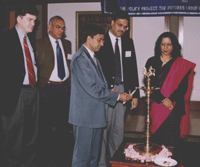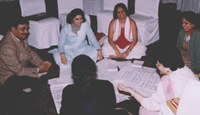Workshop
The HIV / AIDS epidemic presents a major challenge to human survival and development. The social and economic consequences of the epidemic are perhaps the most serious threat to mankind
 Uttar Pradesh is today categorised as one of the low prevalence states in the country. Consequently, the efforts by the National AIDS Control Organization (NACO) to combat the epidemic are limited in their scope, the priority accorded & resources allocated to them. However, it is feared that UP will not remain at its low prevalence level for long unless urgent steps are taken to prevent the spread of HIV / AIDS. The HIV infection in Uttar Pradesh, with its 170 million people and large vulnerable population engaged in high risk behaviour, has the potential to explode. Infact we could be headed for a catastrophe similar in magnitude to that witnessed in many sub-Saharan African countries.
Uttar Pradesh is today categorised as one of the low prevalence states in the country. Consequently, the efforts by the National AIDS Control Organization (NACO) to combat the epidemic are limited in their scope, the priority accorded & resources allocated to them. However, it is feared that UP will not remain at its low prevalence level for long unless urgent steps are taken to prevent the spread of HIV / AIDS. The HIV infection in Uttar Pradesh, with its 170 million people and large vulnerable population engaged in high risk behaviour, has the potential to explode. Infact we could be headed for a catastrophe similar in magnitude to that witnessed in many sub-Saharan African countries.
Recognising this threat, SIFPSA with support from USAID, decided to develop a state specific strategy that maps out areas and population most at risk and provides guidance and direction for effective prevention measures. As a first step in the strategy development process, a group was set up to look at various existing HIV / AIDS related studies, behavioural surveys and interventions in Uttar Pradesh. This group was anchored by Executive Director, SIFPSA. The data available was then shared with experts who prepared papers on different aspects of HIV / AIDS in UP. A three day workshop was jointly organized by SIFPSA, the UP AIDS Control Society (UPSACS) and the POLICY Project at Agra from 29 – 31 January, 2004. This signalled development of a partnership between these three organizations, which it is hoped, will work like a triple cocktail for combating HIV / AIDS in UP.
The objectives of the workshop were to :
- Understand the epidemiological situation and trends in Uttar Pradesh and the response so far.
- Identify the routes of the spread of HIV infection and behaviour patterns that contribute to the risk.
- Review successful interventions to prevent HIV / AIDS in Uttar Pradesh and those that need to be strengthened and scaled up.
- Use the experience from different parts of the country to identify effective prevention strategies for reaching out to the more vulnerable sub-populations.
- Develop an action plan identifying interventions, responsibilities and resource requirements for the next five years.
 The workshop brought together experts, policy makers, programme managers from government and NGOs and people representing networks of HIV positive people who deliberated upon various issues related to combating HIV / AIDS. Twenty five papers on subjects ranging from situation analysis to migration patterns, from identification of vulnerable populations to communication strategies, from care and support, to targeted interventions among high risk groups, and the urgent need for multisectoral involvement were presented at the workshop.
The workshop brought together experts, policy makers, programme managers from government and NGOs and people representing networks of HIV positive people who deliberated upon various issues related to combating HIV / AIDS. Twenty five papers on subjects ranging from situation analysis to migration patterns, from identification of vulnerable populations to communication strategies, from care and support, to targeted interventions among high risk groups, and the urgent need for multisectoral involvement were presented at the workshop.
The participants included Mr R. K. Mittal, Principal Secretary, Medical & Health, UP, Mr. Rajendra Bhonwal, Principal Secretary, Family Welfare, UP, Dr. Randy Kolstad & Mr. Sanjay Kapoor from USAID, experts like Dr. Bitra George from FHI & Dr. Jyoti Mehra from Engender Health, Ms. Anjali Gopalan and Ms. Geeta Venugopal working in the field of HIV / AIDS, a team from UPSACS led by Ms. Aradhana Johri, Project Director, Dr. G. Narayana and his staff from the POLICY Project & a large SIFPSA team including programme managers from the private sector, public sector & IEC divisions led by Mr. J.S. Deepak, Executive Director.
After two days of presentations and discussions and group work on the third day, a variety of valuable suggestions came up from which a comprehensive strategy and an action plan for the state would be crafted.This strategy will provide a basis for intervening more strongly in the area of HIV/AIDS in UP.
Get in Touch with us
(Uttar Pradesh), INDIA
E-Mail : info@sifpsa.org
Phone :(91 - 0522) 2630902,997,741,896,899,894
Fax :
Site Manage by : MARG Software Solutions
2016 © SIFPSA All Rights Reserved
Number of Visitors

